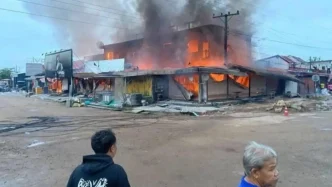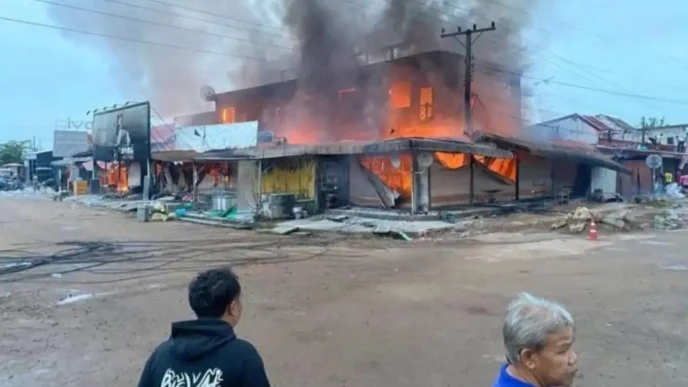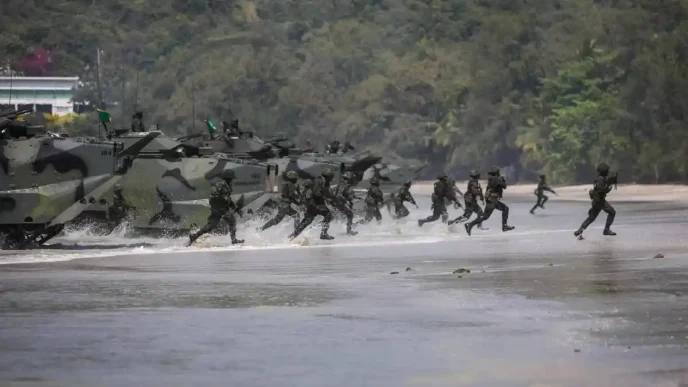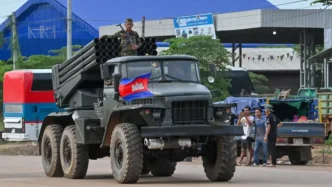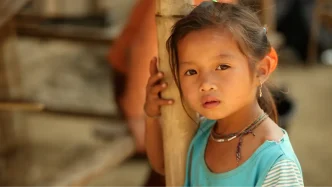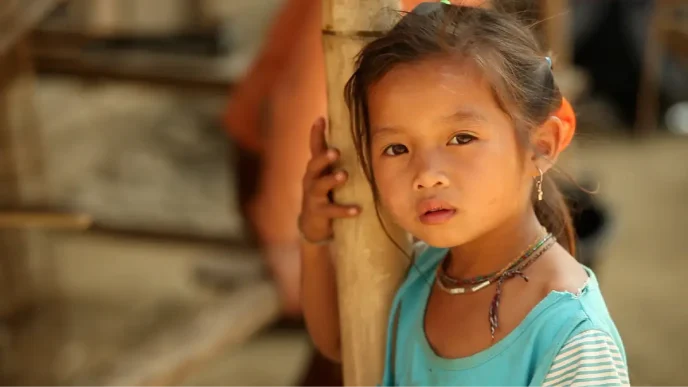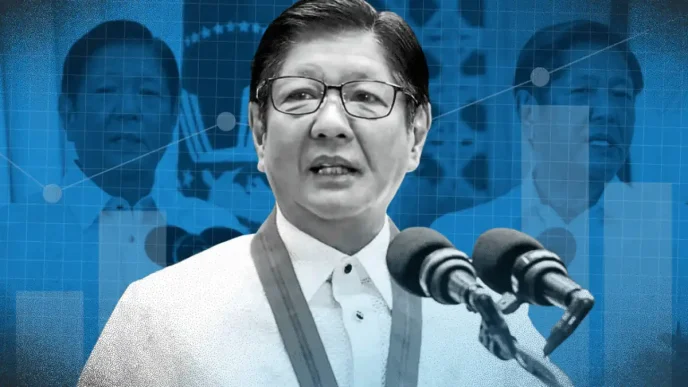More than 300 farmers from central Thailand descended on Bangkok on Tuesday, marching from the Ministry of Agriculture and Cooperatives to the vicinity of Government House near Makkhawan Rangsan Bridge. Their demand was clear: urgent government intervention to guarantee rice prices at 11,000 baht per ton (at 15% moisture content) to alleviate their mounting financial struggles. Representing provinces such as Phichit, Nakhon Pathom, Suphan Buri, Ang Thong, Lop Buri, and Ayutthaya, the farmers delivered a petition backed by 50,000 signatures, pressing Prime Minister Paetongtarn Shinawatra for immediate action.
The demonstration, led by a sound-amplifying bus, underscored the deepening frustration among Thailand’s agricultural communities, who form the backbone of the country’s economy as one of the world’s leading rice exporters. The farmers’ coordinator, Assistant Professor Natthachalai Mayurasak, issued a stark ultimatum: if the government fails to respond within seven days, the group’s leadership will return, and further escalation could follow if their concerns remain unaddressed. While Natthachalai refrained from commenting on potential calls for the removal of Commerce Minister Phichai Naripthaphan, the underlying discontent with current policies was palpable.
A Sector Under Strain
Thailand’s rice farmers have long grappled with volatile market prices, high production costs, and unpredictable weather patterns exacerbated by climate change. The demand for a guaranteed price of 11,000 baht per ton reflects a desperate bid for stability in an industry where many smallholders operate on razor-thin margins. Natthachalai suggested that if legal barriers prevent direct price guarantees, the government could issue a royal decree to bypass such obstacles—a proposal that hints at the urgency and perceived inflexibility of existing frameworks.
The farmers’ grievances are compounded by what they describe as impractical conditions tied to previous government measures. While specifics of these conditions were not outlined during the protest, the sentiment echoes broader criticisms of agricultural policies in Thailand, which often fail to address structural issues such as access to credit, subsidies, and market protections. For many, the march to Government House was not just a plea for price support but a broader cry for recognition of their plight in national policymaking.
Tuesday’s protest saw initial disappointment when no deputy prime minister was available to receive the petition in person. Instead, Deputy Secretary-General to the Prime Minister, Somkid Chuakong, accepted it on behalf of Paetongtarn. This symbolic snub did little to assuage the farmers’ frustrations, with Natthachalai warning that a lack of progress could lead to intensified action. What form this escalation might take remains unclear, but the resolve of the group—bolstered by the sheer scale of signatures on their petition—suggests that this issue is far from resolved.
Economic and Political Implications
The farmers’ demands arrive at a critical juncture for Thailand’s economy, where agriculture remains a significant contributor to GDP and employment, particularly in rural areas. Rice, often dubbed the “lifeblood” of Thai agriculture, is not just a commodity but a cultural and economic staple. Yet, global market fluctuations, competition from other rice-producing nations like Vietnam and India, and domestic policy missteps have placed immense pressure on farmers. A guaranteed price mechanism, while potentially stabilising for producers, raises questions about fiscal sustainability and market distortions—issues that the Shinawatra administration must weigh carefully.
If implemented, a price guarantee of 11,000 baht per ton could cost the government billions of baht annually, depending on market conditions and production volumes. Critics of such schemes, often citing past rice-pledging policies under previous administrations, argue that they risk creating inefficiencies and burdening taxpayers. The controversial rice-pledging scheme under Yingluck Shinawatra, Paetongtarn’s aunt, led to massive financial losses and allegations of corruption, a historical precedent that looms large over current debates. While there is no evidence to suggest similar mismanagement in the current proposal, the government will likely tread cautiously to avoid rekindling public scepticism.
Politically, the protest adds to the challenges facing Paetongtarn Shinawatra, who assumed office in 2024 amid promises to bolster economic recovery and address inequality. Rural voters, including farmers, have historically been a key constituency for the Shinawatra family and their associated political movements, such as the Pheu Thai Party. Failing to address these demands risks alienating a significant support base, particularly in central and northern provinces where agricultural livelihoods dominate. Conversely, acceding to the demands without a clear funding strategy could draw criticism from urban voters and fiscal conservatives, placing the prime minister in a delicate balancing act.
Regional Context and Farmer Movements
The Bangkok protest is not an isolated event but part of a broader wave of agricultural unrest across South East Asia, where smallholder farmers face similar challenges. In neighbouring countries like Vietnam, government-led initiatives often provide more structured support for rice farmers through export quotas and price stabilisation funds, though these come with their own trade-offs. In Indonesia, meanwhile, farmers have also staged protests over fertiliser costs and land rights, reflecting a regional pattern of discontent with agricultural policy frameworks.
For Thailand, the issue of rice prices is particularly sensitive given the country’s historical role as a global rice exporter. Any policy shift—whether towards price guarantees or alternative support mechanisms—could have ripple effects on international markets, potentially influencing trade negotiations and relations with importing nations. If the government opts for a royal decree as suggested by Natthachalai, it could also set a precedent for bypassing legislative gridlock on other economic issues, raising questions about governance and accountability.
Voices from the Ground
The human dimension of the protest cannot be overlooked. Farmers from provinces like Suphan Buri and Ayutthaya, often referred to as Thailand’s “rice bowl,” spoke of mounting debts and the inability to cover basic costs such as fertilisers and irrigation. Many expressed frustration at being caught between fluctuating market prices and government inaction, with some describing the march to Bangkok as a last resort after years of unmet promises.
“We cannot wait any longer. Every season, we lose more. The government must listen now, or we will come back stronger,” one farmer from Phichit told local reporters on the sidelines of the protest. While such sentiments are not uncommon in rural Thailand, the scale of Tuesday’s demonstration—coupled with the threat of escalation—suggests a tipping point may be near.
Looking Ahead: A Seven-Day Deadline
As the seven-day deadline looms, all eyes are on Government House. Will Paetongtarn’s administration offer a concrete response, or will the farmers’ ultimatum lead to further confrontation? The prime minister has yet to comment publicly on the protest, but her government’s handling of this issue could set the tone for her tenure on rural and economic policy.
Speculative estimates suggest that meeting the farmers’ demands could provide short-term relief to thousands of households, potentially stabilising rural economies in key provinces. However, these projections remain unconfirmed, and there is no evidence to indicate whether the government has the fiscal capacity or political will to implement such a policy. If reforms are introduced, they may also need to address broader structural challenges—such as access to affordable credit and climate-resilient farming practices—to ensure long-term sustainability for the sector.
For now, the farmers of central Thailand wait, their resolve hardened by years of struggle. The coming week will test not only the government’s responsiveness but also its ability to bridge the gap between rural realities and national priorities. Whether through dialogue or further protest, their voices are unlikely to fade quietly.



